
IV. Socio-ecological footprint:
-
• Most important: Degradation of the protection level of a State regulated and State protected area. Undermining the control and regulation capacity of the body responsible for the national park Laguna san Rafael.
-
• Exploitation of the achievements of the local population: The value of the land and nature so far preserved, the joint efforts to protect the nature of the valley and its image were exported and sold to and by external players of the media market, through a typical “greenwashing”. No ecosystem services locally paid.
-
• One of the area of the filming is specially protected for its fragile biodiversity, under threat now.
-
• Increased anthropogenic stress through the interest of mass tourism and traffic to the closed sector of the national park through private rural land, increased insecurity in the valley Leones.
-
• The small, mainly agricultural, landowners of the valley see their property and other rights and interests ignored. Previously done road repairs on a road used by the community are being removed to prevent further invasions.
-
• For the nature protection project: the substantial efforts deployed to give the still vulnerable nature and wildlife a chance to regenerate are compromised by exposure, disrespect and misuse of resources.
-
• Probably compromising the UNESCO biosphere reserve status: staging “influencers” are not listed as a management tool in the management plan of the UNESCO biosphere reserve Laguna san Rafael. www.iamag.co/huawei-gnu-gnu/

III. Status of “influencers”:
Definition of influencers: “natural or legal persons who, for a fee, mobilize their notoriety among their audience to communicate to the public, by electronic means, content aimed at promoting, directly or indirectly, goods, services or any cause.”
Legal issues:
According to valid partnership contracts with brands, communication agencies, distribution platforms, influencers must assume responsibility for the content they publish and the possible consequences of their distribution. They are responsible for the information on the legal status and validity of promoted businesses, as well as for the veracity of the prices announced.
Lawsuits for damages, resulting from social media advertising and the consequent violation of the property rights of local farmers, directly against “influencers”.
1. Responsibilities:
A. Civil liability:
- Information and advice obligations;
- In the event of non-compliance: influencers may incur civil liability and be required to compensate the damage suffered by the victims. Victims may in particular seek compensation for material damage (such as loss of property or a sum of money) or moral damage (such as damage to reputation or image).
B.Criminal liability:
- Misleading advertising: Influencers may be held criminally liable for misleading advertising or unfair commercial practices. Misleading advertising is characterised by the dissemination of false or misleading information, and can lead to criminal sanctions; Europe: law on responsibility for false information.
- Influencers can be held criminally liable for defamation or invasion of privacy.
C. Fiscal and social responsibility. According to labour law, no matter the post or video is marked as paid propagation or not, no matter what is the form and type of agreement between the marketer and the influencer, and no matter what is the legal status of the influencer (entrepreneur with a trading license or non-business subject without any license), any income of the influencer is liable to the income tax.
2. Transparency:
- Influencers are required to comply with the transparency and advertising obligations imposed by the law. They must clearly indicate the commercial nature of their content when presenting products or services.
- In the event of non-compliance with these obligations, they are exposed to civil, criminal and administrative sanctions. Civil liability can result in paying damages for victims.
- The influencer is responsible for the quality and delivery of the products they promote. Commercial communication must be verifiable, otherwise it is a fraudulent commercial practice.
-
-Influencers may be sued for violating the guidelines for advertising and endorsement on social media, such as failing to disclose compensation or making false or misleading claims.
2. Some relevant legal issues:
- Affects a State owned and State regulated area: Disseminating false information on a State owned and regulated area is, as a rule, illegal.
- Professional filming in national parks: can be done only with special formal authorisation.
Filming for tourism purposes by drones is not authorised.
- All commercial promotions shall be clearly identified as such, see below.
-
-Filming in clearly identified private properties with no authorisation by the landowners:
you need permission from the owner or manager of the private property to film or take
photographs while on the property. Any commercialisation of such filming or photographing
can be done only under officially sought agreement with the legal owner of the property.
-
-It’s illicit to advertise and sell for own benefit the use of private land
of others (more than 15 properties in this case),
and in particular of a State regulated area.
-
-The compensation for damages can be claimed under respective civil law
procedures directly from those who disseminate publicly the
wrong information and publish false advertising.
10 000 "likes" cost from 40 to 80 US $ online.
You may see similar examples on the site for responsible use of protected land
designed to protect nature areas from “influencers” of social media.
"So I always ask myself, is it about likes and themselves
or do they really care about the planet and nature?"
Instagram ruining the great outdoors
How Instagram is destroying natural wonders
We’ve had enough of instagramers destroying our nature
Influencers promote destroying our planet with overconsumption
After a long story of non-respect of different components of the legislation in force by the social media,
the following was the no-return point:
I. An illustrative case of deleterious effects of social media’s self-promotional campaigns in nature protected areas, with legal consequences and damage for this land conservation and nature restoration project:
A risky promotional ice water swimming challenge was organised in the lake of the glacier Leones by a couple of “influencers” (@barbarehlla_h and Isidora Ureta), and the tour operator Ruta Leon who had no permits for the area. In the national park closed at that time (23.01.2021) by the regional Conaf resolution 57/2020. With little attention paid to the safety rules for such "challenges". In the midst of the pandemic, ignoring completely the Covid-19 sanitary rules in force at that time. In a lake where several lethal accidents occurred in the previous years. The accompanying TVN crew filming the event was performing filmmaking in private properties without any contact with nor authorisation by the landowners. The “event” in the lake and glacier, which have neither habilitated public access nor professional rescue coverage, has been (see below) widely and continuously promoted on social networks and in the mass media (first broadcast: TVN 10 July 2021), including the publication of inadequate information about the area.
Social media and photography are killing live biodiversity.
Relevant legal issues: Tita Ureta , Barbara hernandez swimmer, @barbarehlla_h, ice mermaid chile
-
• With a tour operator who did not have any permit or concession for the area.
-
• Completely ignoring the official closure of the NPLSR.
-
• Commodifying natural protected spaces for own benefit.
-
• The filming was done in contravention of the basic norms for professional/commercial filming of the legislation on audio-visual services and audiovisual law, including in national parks. Filming commercials in private land without any permission of the landowners
-
• Deceptive advertising: false information about the non-tourism destination; hidden advertising and greenwashing. Commercial messages on social networks must be marked as advertisements.
-
• Responsibility for advertising tourism business operating without permission.
-
• Violations of health regulations for Covid-19: Generating the risk of spreading pathological agents in violation of a legal order issued by the health authority at times of epidemic is a criminal offense under national law. Photos from surveillance available.
-
• Anyone using public lands to advertise and create private profit or gains falls under the umbrella of specific legislation on State protected areas and National biodiversity service: Conducting or participating in a non-permitted commercial activity on public lands can carry a penalty. Most influencers believe that A) either the laws do not apply to them, or B) plead ignorance. Not only are they taking money from public lands, they are also taking money out of the pockets of permitted companies who pay the money to get the permits, credentials and insurances required to conduct these activities legally.
Authorization to film or photograph in protected wilderness areas
-
• Use of clearly indicated properties of others for own profit: commercials were were filmed in private land, with no contact with the landowners; inciting trespassing private land. Equivalent to fraudulent advertising.
-
• Product of the unauthorised commercial filming was sold through the production company, issues of fraudulent use of property of others and of disposing of their property against their will were raised under civil law procedures.
-
• Payments of reparations and compensation to the wronged landowners for revenues from filming and advertisements, as well as losses for private landowners and farmers were calculated in monetary terms, unjustified enrichment issues raised.
-
• Copyright issues: the image of the property of others was sold under own presumed copyright (of the influencers and the tour operator). Trading license issues: under which license the use of property was traded?
-
• Taxation issues: General issue of taxation of influencers, for profits made, including sponsorships. No contract was concluded between the landowners and the influencers and the tour operator, how were the taxes paid?
-
• The publicity of such promotional “events”, illicit filming and tour operators without permission, continues. In order to perpetrate this “initiative”, taken during the pandemic, an exclusive contract was concluded. Also see below.

Liability and responsibility of social media,
of travel, sport etc. “influencers”

-
II.A “travel influencer”, example 2024: @benjavalenzuelawallis , sponsored by Ladera Sur:
1. Advertising: tourism invasion of a closed sector of a State protected area, a tour operator who does not have permit for operating, public access to strictly private properties and homes, deceptive business practices, illicit online content. Creating thus a content of a “false destination” or fraudulent publicity. Filmed in clearly identified private properties, including commercials, without any consultation with the landowners. benjamin valenzuela wallis
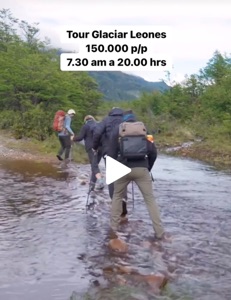
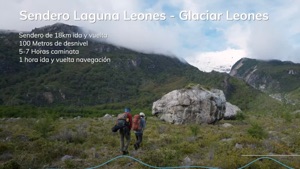
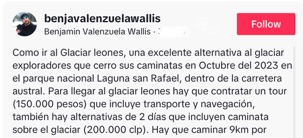
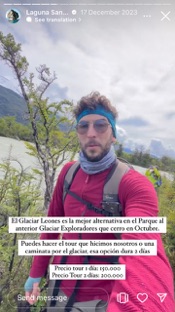
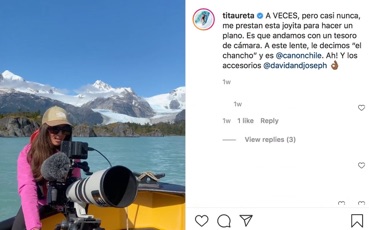


“A great way to defend yourself from them is to avoid being like them”, Marcus Aurelius.
UNESCO 2024 survey: 2/3 of digital content creators (“influencers”) do not check their facts before sharing.
Responsibility of social media for the destruction of the glaciers:
Continued in

Influencers can be prosecuted for all these offenses. All these cases were reported to the administration and fiscalisation of the NPLSR. For civil law claims please contact the Influencers directly.

Continuation in : https://rutaleon.info/redes-sociales
